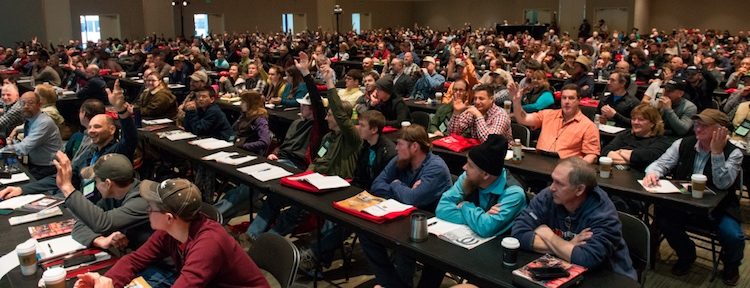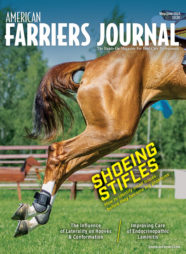At the 2016 International Hoof-Care Summit, veterinarian and researcher Renate Weller delivered a talk on why tendons and bones break. Following this presentation, she asked for a show of hands of farriers who would be interested in a research program developed by the Royal Veterinary College (RVC), where she teaches and conducts research. Several audience members showed their support and interest for such a program, as shown in the picture above. Now Weller and the RVC are taking more formal steps to develop such a program.
The RVC released a call for expression of interest in a graduate diploma in applied equine locomotor research at the college. Below is the request and how to apply:
What’s on offer?
Are you a practicing Farrier – interested in developing your practical work into scientific knowledge and applying some evidence based learning to gain a better understanding of your daily work? Are you considering enrolling for any of the higher education programmes of the Worshipful Company of Farriers? The new Graduate Diploma in Applied Equine Locomotor Research being launched by the Royal Veterinary College (RVC) offers professional farriers the chance to apply your practical experience and get involved in contributing to research into the scientific evidence behind farriery. At the same time it will count towards your professional development and will fulfill the thesis requirements of the WCF Fellowship examination.
Why chose this course?
Participants in the course will develop their scientific and academic skills, directly related to the field of farriery and equine locomotion, in order to produce their own research project to the highest professional standard.
Graduates will be awarded a Graduate Diploma in Applied Equine Locomotor Biomechanics Research, which is a Level 6 (FHEQ) UK Higher Education qualification.
How much study time is involved?
The course comprises four modules which are studied over eight two-day sessions. It is expected the whole course will run over 24 months, with self-study tasks (“homework”) in between sessions. We anticipate this will necessitate up to eight hours of self-study per week, the majority of which will involve collecting data alongside your usual working activities.
Module 1: Fundamentals of Equine Locomotion
Module 2: Research Project: Data – collection and analysis
Module 3. Presentation and Discussion
Module 4. Written Thesis on Research project
Modules 1 – 3 will be held in the winter months (UK). Feedback will be given on the “homework”. The last module (module 4) will comprise a written thesis on an original research project, designed, conducted and written by the participant. Assessment will be by course work – there are no exams and your studies will be supported at every stage.
Who will I be taught by?
The teaching on the course will be led by, Dr Renate Weller, Professor in Comparative Imaging and Biomechanics and Dr Thilo Pfau, Senior Lecturer in Bioengineering. Additional teaching and support will be provided by two of the world’s leading research farriers, Dr. Chris Pardoe and Simon Curtis, and other RVC staff, such as equine clinicians, pathologists, epidemiologists and statisticians as needed.
The participants will have access to the RVC library resources enabling them to access to all relevant books, journals and other publications they may need. The course will have its own online back-up material, support system, reading materials and discussion boards.
How much does the course cost?
The final costing of the course has not been confirmed and will depend on numbers, but we anticipate at this stage that the annual fee will be approximately £1500, which can be spread over three installments.
How do I apply?
The RVC is very excited to be developing this new initiative and would like to invite farriers to express their interest by e-mailing Dr. Weller on farriery@rvc.ac.uk by Feb. 22, stating their interest, when they would most likely consider enrolling and if they would prefer an online only course, a residential course or a blend between the two. All information will be treated confidentially.








Post a comment
Report Abusive Comment